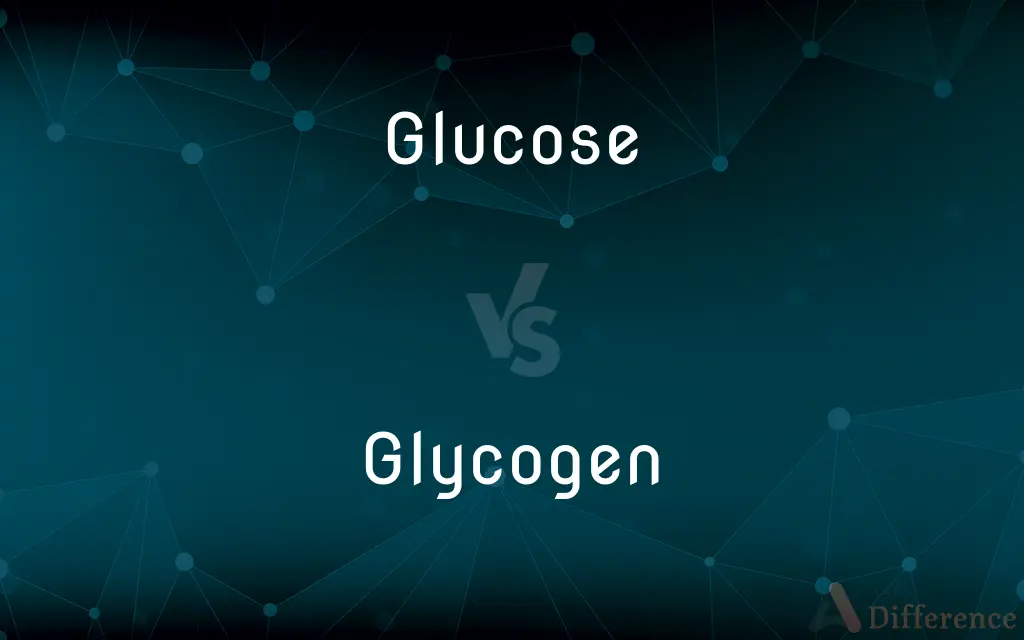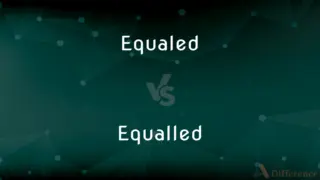Glucose vs. Glycogen — What's the Difference?

Difference Between Glucose and Glycogen
ADVERTISEMENT
Compare with Definitions
Glucose
Glucose is a simple sugar with the molecular formula C6H12O6. Glucose is the most abundant monosaccharide, a subcategory of carbohydrates.
Glycogen
Glycogen is a multibranched polysaccharide of glucose that serves as a form of energy storage in animals, fungi, and bacteria. The polysaccharide structure represents the main storage form of glucose in the body.
Glucose
A simple sugar which is an important energy source in living organisms and is a component of many carbohydrates.
Glycogen
A polysaccharide, (C6H10O5)n, that is the main form of carbohydrate storage in animals and is found primarily in the liver and muscle tissue. It is readily converted to glucose as needed by the body to satisfy its energy needs. Also called animal starch.
Glucose
A monosaccharide sugar, C6H12O6, that is used by living things to obtain energy through the process of aerobic respiration within cells. It is the principal circulating sugar in the blood of humans and other mammals.
ADVERTISEMENT
Glycogen
(carbohydrate) A polysaccharide that is the main form of carbohydrate storage in animals; converted to glucose as needed.
Glucose
A colorless to yellowish syrupy mixture of dextrose, maltose, and dextrins containing about 20 percent water, used in confectionery, alcoholic fermentation, tanning, and treating tobacco. Also called starch syrup.
Glycogen
A white, amorphous, tasteless substance resembling starch, soluble in water to an opalescent fluid. It is found abundantly in the liver of most animals, and in small quantity in other organs and tissues, particularly in the embryo. It is quickly changed into sugar when boiled with dilute sulphuric or hydrochloric acid, and also by the action of amylolytic ferments.
Glucose
(carbohydrate) A simple monosaccharide (sugar) with a molecular formula of C6H12O6; it is a principle source of energy for cellular metabolism.
Glycogen
One form in which body fuel is stored; stored primarily in the liver and broken down into glucose when needed by the body
Glucose
A variety of sugar occurring in nature very abundantly, as in ripe grapes, and in honey, and produced in great quantities from starch, etc., by the action of heat and acids. It is only about half as sweet as cane sugar. Called also dextrose, grape sugar, diabetic sugar, and starch sugar. See Dextrose.
Glucose
Any one of a large class of sugars, isometric with glucose proper, and including levulose, galactose, etc.
Glucose
The trade name of a sirup, obtained as an uncrystallizable reside in the manufacture of glucose proper, and containing, in addition to some dextrose or glucose, also maltose, dextrin, etc. It is used as a cheap adulterant of sirups, beers, etc.
Glucose
A monosaccharide sugar that has several forms; an important source of physiological energy
Share Your Discovery

Previous Comparison
Along vs. Together
Next Comparison
Equaled vs. Equalled













































